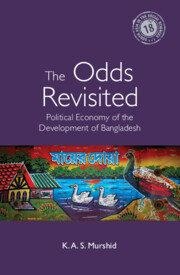Book contents
- Frontmatter
- Dedication
- Contents
- List of Tables and Figures
- Acknowledgements
- List of Abbreviations
- Introduction
- 1 A Bird’s-Eye View of the Bangladesh Economy: 1971–2020
- 2 Initial Conditions: The Odds Revisited
- 3 The Food Security Challenge
- 4 Exploring Transition and Change in the Rice Market
- 5 International Migration
- 6 The Rural Non-farm (RNF) Sector
- 7 Industrialization and the Rise of RMG
- 8 Industrialization: Other Stories
- 9 The Social Sector Puzzle
- 10 Dhaka: Capital Formation—Urbanization, Competition and the Rise of a Business Class
- Conclusion
- Notes
- Glossary
- References
- Index
Conclusion
Published online by Cambridge University Press: 30 June 2022
- Frontmatter
- Dedication
- Contents
- List of Tables and Figures
- Acknowledgements
- List of Abbreviations
- Introduction
- 1 A Bird’s-Eye View of the Bangladesh Economy: 1971–2020
- 2 Initial Conditions: The Odds Revisited
- 3 The Food Security Challenge
- 4 Exploring Transition and Change in the Rice Market
- 5 International Migration
- 6 The Rural Non-farm (RNF) Sector
- 7 Industrialization and the Rise of RMG
- 8 Industrialization: Other Stories
- 9 The Social Sector Puzzle
- 10 Dhaka: Capital Formation—Urbanization, Competition and the Rise of a Business Class
- Conclusion
- Notes
- Glossary
- References
- Index
Summary
Despite the Odds
The odds against Bangladesh were heavily stacked as the country faced war, devastation, floods, famine and severe political instability beginning in 1971 and continuing off and on for at least two decades before reaching a semblance of stability. In addition, the country faced a huge burden of poverty, malnutrition and hunger but was bereft of resources with which to tackle these. Despite such grave handicaps, the country registered sharp progress across a large number of fronts, recording improvements in health and education, nutrition and poverty, women's empowerment, water sanitation and food production. It was able to begin the process of export-led industrialization as in other parts of Asia, shedding its aid dependence and ‘basket case’ image, growing steadily at around 5 per cent in the 1990s and over 6 per cent from the early 2000s. This sustained, stable macroeconomic performance, the rapid pace of industrialization and a growing indication of economic diversification suggests that Bangladesh has spread its wings to join the ‘flying geese’ flock of Asia as its latest member behind Vietnam, having in the meantime achieved ‘club convergence’ in its immediate South Asian vicinity.
Food and Population
The GR had already transformed the agriculture of countries like Mexico, Philippines and Punjab (in India and Pakistan). Initially, the GR was focused on wheat but the success of the Philippines, which experienced large rice productivity increases, held out promise for impoverished rice-growing areas in South Asia.
However, for the GR to succeed, preconditions were required, including irrigation and transport infrastructure, rural roads, and complementary inputs like chemical fertilizers and seeds needed to be made available and accessible to farmers. Here, the public sector backed by donors and suitable policy reforms was able to rise to the challenge, despite the widespread reports of poor governance.
This, along with fertility declines, constituted Bangladesh's main achievement of the 1980s and 1990s – one that was central to its development journey.
The impact of the GR was immense: on rural wages, on food prices and consumption, and on poverty, and the government budget and BOP – the last resulting from a much-reduced need to make large food imports.
- Type
- Chapter
- Information
- The Odds RevisitedPolitical Economy of the Development of Bangladesh, pp. 217 - 232Publisher: Cambridge University PressPrint publication year: 2022

